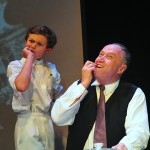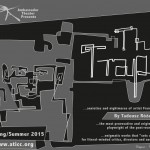
It’s easy to misunderstand the avant-garde: we come to the theatre expecting a normal story told by actors who are easy to follow, with sets that are exactly what they appear to be. And when a production deviates from the norm we tend to squirm, flip through the program and hope the intermission comes soon so we can split for the bar down the block.
Why can’t they just give it to us straight? Because for many of us life is irreparably complex, our experience shattered by tragedies and burdens that typical audiences cannot begin to imagine. In order for the artist to tell that story and do it justice, nothing about it could possibly be normal.
Consider Samuel Beckett, who spent years in the Resistance during World War II roaming the desolate, war-torn French countryside waiting for his next contact-an experience echoed in his masterpiece Waiting for Godot. Now consider the life of another artist whose country’s existence has hung repeatedly in the balance, a man who experienced Nazi occupation, bore witness to the Holocaust and then endured over forty years of Communist dictatorship. How can you express the psychological devastation of all those years, combined with the artist’s indomitable will to rise from the ashes again and again? To stage this experience as if it were normal would render it ridiculous.
Ambassador Theater, with their production of Polish poet Tadeusz Rózewicz’s masterpiece The Trap, has introduced Washington audiences to another theatrical genius of Beckett’s stature. Like Beckett, Rózewicz fought the Nazis; unlike Beckett, Rózewicz did not have the luxury of spending the rest of his career writing as he pleased in the democratic West. Instead he had to navigate the treacherous waters of Soviet rule, where literature became a battleground and attacks needed to be carefully staged indeed. Through his collaboration with artists like the great director Tadeusz Kantor in Krakow, Rózewicz developed theatrical techniques that reflected his own life and enabled his audiences to think deeply about what they were living through.
The Trap was inspired by Rózewicz’s love for the Czech author Franz Kafka; but because Kafka was Jewish, and because works like Metamorphosis, The Trial and The Castle anticipated the nightmares of Nazism and totalitarianism which came soon after his death (he died in 1924), his works were banned throughout Eastern Europe. Kafka was forbidden at the very moment when people needed his artistic vision the most.
It is easy to see why Rózewicz found a kindred spirit in Kafka, someone who understood what the future held and who could give voice to the suffering that plagued so many for so long. What makes Kafka even more compelling is the way his suffering was largely self-imposed; imprisoned by his need to write and struggling with ailments that would send him to an early grave, he tried desperately to live but was plagued by self-doubt. A self-doubt so deep that he asked to have his writings burned after he died; (fortunately for us his best friend, Max Brod, refused to do so).
The Trap traces key elements in Kafka’s life-his domineering father, his sympathetic (and mischievous) sisters, his serial engagements to women, his affairs, etc. Rózewicz’s masterstroke is the way he weaves the much darker future-the rise of Nazism, his sisters’ death in the Holocaust, and the long Soviet occupation-with the troubled ‘present’ of Kafka’s time.
Rózewicz creates a space in which past, present and ominous future occur simultaneously; Franz, the Kafka character, is accompanied throughout the show by Animula (“little soul,” played affectingly by Alexander Rolinski), a young boy who accompanies Kafka and witnesses everything. We’re free to interpret Animula as we see fit – is he Kafka’s pure soul? Is he Kafka as a boy, a reminder of lost innocence? Does he represent the child-like vision of the artist? Whatever we choose to see in him, his presence haunts much of what follows.
Meanwhile a small phalanx of Soviet-era, trench-coated secret police (costumed by SigrÃdur Jóhannsedóttir) move in and around the stage, performing set changes and quietly reinforcing our sense of paranoia. Kafka’s paranoia was primarily personal, but would soon become a defining experience for the generations that followed. These police also greet you in the lobby, conducting you upstairs to the theatre in stiff, formal fashion-a reminder that even in the pre-internet age, privacy in some places had already disappeared.
Leading the cast is Matthew Payne, who as Franz captures the anxiety and exuberance of the artist. His delivery is rushed at times, and is of a piece with a young man who suspects that his end is near, but who has a world of words to communicate. Colin Davies, as the Father, rules the stage as the petty dictator of Franz’s household, (Kafka fans will remember he wrote an epic diatribe against him). Davies’ forceful performance calls to mind Steven Berkoff, whose interpretations of Kafka are themselves legendary.
It would be a very long review to list all the fine performances in the supporting cast; but well worth mention is Madeline Burrows who shines as Ottia, Franz’s ever-cheerful sister; Burrows also has a chilling pre-show role as TV journalist/interrogator in the theatre lobby, a spectacle in which she questions a caged Franz. Morganne Davies and Ariana Almajan likewise light up the stage as Felice and Grete, two of the most important women in Franz’s life. And Benjamin Koontz gives a solid performance as Max, Franz’s close friend, his anchor in reality and-by virtue of receiving his papers for burning-Franz’s de facto literary executor.
Director Hanna Bondarewska has assembled an inventive creative team, who give us a vivid glimpse of the Polish avant-garde. Set designer Carl Gudenius has filled this bare, experimental space with trapezoidal projection screens and, most intriguingly, ominously-shaped oblong boxes. In this world, things are never really as they seem; when standing the boxes appear to be wardrobes and fireplaces, and when laid flat they can be beds, benches, dinner tables – and yet the inescapable image of the coffin is there as well. Bondarewska and Kathy Gordon choreograph scene changes to forefront the ever-changing nature of life in Kafka’s Prague, accompanied by composer Jerzy Satanowski’s haunting score; Satanowski incorporates a variety of instruments and themes, which comment on and aid the momentum of each scene.
Gudenius’ scenic flats become the locus of a series of fascinating projections, designed by Riki Kim; alternating between abstract figures, barbed wire and blossoming flowers (often shown as photographic negatives), Kim’s work heightens the sense of alienation and fragmentation experienced by the characters onstage.
The Trap is a rarity for Washington; a glimpse of an avant-garde movement whose techniques were forged in the crucible of two world wars and decades-long Communist dictatorship. The result is a fascinating evening of theater, and one that artists in DC would do well to study.
Production Photo: Matthew Payne as Franz, with Madeline Burrows as Ottia. Photo by Valentine Radev.
Advisory: the show includes brief nudity, dramatizations of the Holocaust, and is more appropriate for audiences 16 and older.
Running Time: 2 hours 40 minutes, with one intermission.
The Trap plays at the XX Building (a former church), 814 20th St. NW. Tickets at:
http://www.aticc.org/home/category/get-tickets .



 It’s easy to misunderstand the avant-garde: we come to the theatre expecting a normal story told by actors who are easy to follow, with sets that are exactly what they appear to be. And when a production deviates from the norm we tend to squirm, flip through the program and hope the intermission comes soon so we can split for the bar down the block.
It’s easy to misunderstand the avant-garde: we come to the theatre expecting a normal story told by actors who are easy to follow, with sets that are exactly what they appear to be. And when a production deviates from the norm we tend to squirm, flip through the program and hope the intermission comes soon so we can split for the bar down the block.
